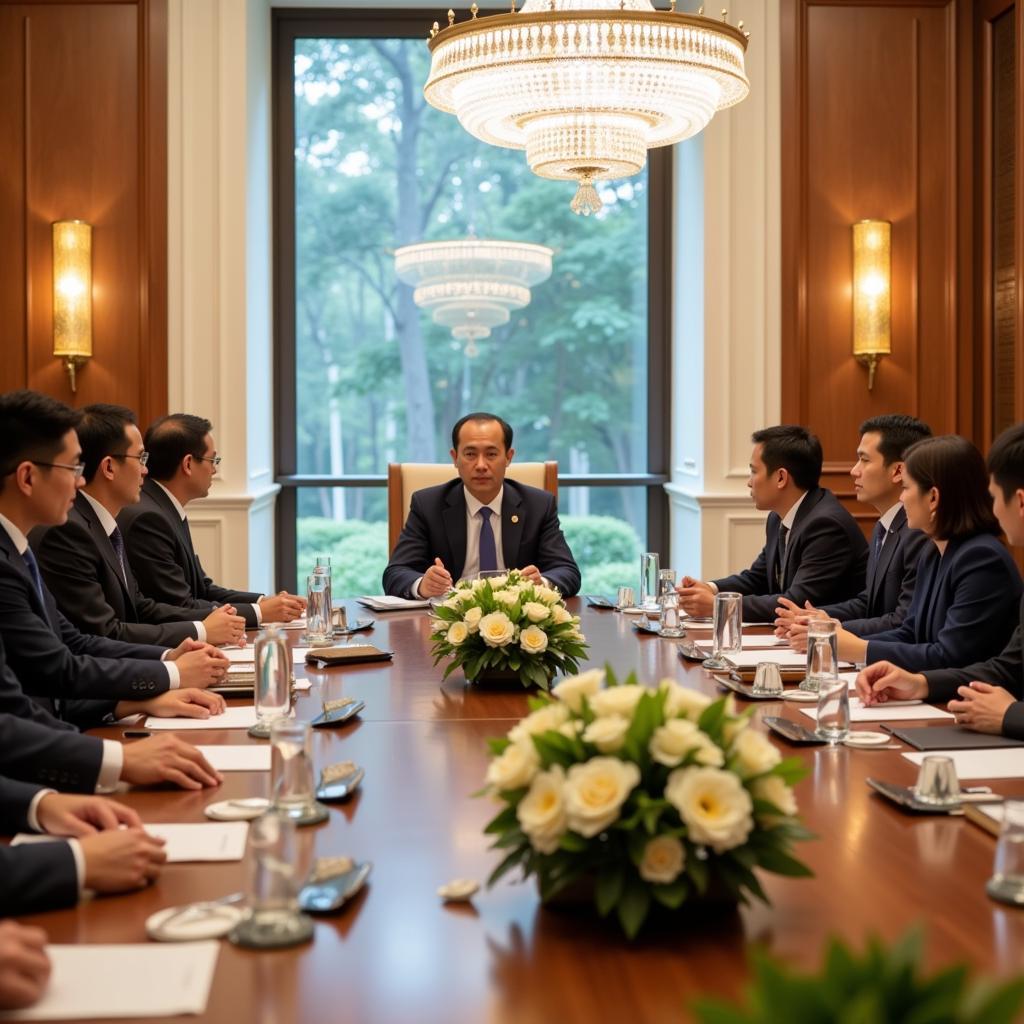Brunei Darussalam’s membership in ASEAN represents a significant facet of the nation’s foreign policy and economic strategy. This article explores the multifaceted relationship between Asean And Brunei, delving into the historical context, economic benefits, socio-cultural impact, and future prospects of this dynamic partnership.
Brunei joined ASEAN in 1984, shortly after regaining its independence. This strategic decision positioned the small nation within a larger regional context, providing opportunities for economic growth, political stability, and enhanced international recognition. ASEAN offers Brunei a platform to engage with regional and global partners, amplify its voice on international issues, and contribute to shaping the regional agenda. The benefits for Brunei are numerous, ranging from increased trade and investment to enhanced security cooperation.
Brunei’s Economic Landscape Within ASEAN
ASEAN’s economic integration initiatives have significantly benefited Brunei’s economy. The ASEAN Free Trade Area (AFTA) has reduced tariffs and non-tariff barriers, facilitating greater trade flows. This has opened new markets for Brunei’s key exports, particularly in the oil and gas sector. Furthermore, ASEAN’s focus on promoting foreign direct investment (FDI) has attracted investments into Brunei, supporting economic diversification efforts.
Brunei also plays an active role in shaping ASEAN’s economic policies. It has been a strong advocate for regional economic integration and has participated in various initiatives aimed at strengthening ASEAN’s economic competitiveness. For instance, Brunei has been a vocal supporter of the ASEAN Economic Community (AEC), which seeks to create a single market and production base for the region.
Socio-Cultural Exchanges and Cooperation
Beyond economics, ASEAN provides a framework for socio-cultural exchanges and cooperation between Brunei and its fellow member states. Educational collaborations, cultural exchange programs, and people-to-people interactions foster greater understanding and appreciation of the region’s diverse cultures. These initiatives contribute to building a stronger sense of community and shared identity among ASEAN citizens.
Challenges and Opportunities for Brunei in ASEAN
While Brunei has undoubtedly benefited from its ASEAN membership, certain challenges remain. The country’s small size and dependence on oil and gas exports make it vulnerable to external shocks. Furthermore, integrating into a larger regional market requires adapting to changing regulations and competition. However, ASEAN also presents opportunities for Brunei to diversify its economy, attract foreign investment, and strengthen its human capital.
What is Brunei’s role in ASEAN’s future?
Brunei has consistently championed ASEAN’s principles of consensus-building and mutual respect. As ASEAN navigates complex regional and global challenges, Brunei’s diplomatic efforts and commitment to regional cooperation will continue to be crucial. The nation’s focus on promoting sustainable development and inclusive growth aligns with ASEAN’s broader agenda.
Brunei and ASEAN: A Future Forged Together
The partnership between ASEAN and Brunei is one of mutual benefit and shared aspirations. ASEAN provides Brunei with a platform to thrive in a globalized world, while Brunei contributes to ASEAN’s strength and resilience. As ASEAN evolves, Brunei will continue to play an integral role in shaping the region’s future, forging a path towards greater prosperity and stability.
 Brunei's minister engaging in a meeting with counterparts from other ASEAN member states, discussing matters of regional cooperation and development.
Brunei's minister engaging in a meeting with counterparts from other ASEAN member states, discussing matters of regional cooperation and development.
In conclusion, the relationship between ASEAN and Brunei is a vital component of Brunei’s national strategy. The benefits of membership are manifold, contributing to Brunei’s economic growth, political stability, and socio-cultural development. While challenges remain, ASEAN offers Brunei numerous opportunities to enhance its regional and global standing. As ASEAN and Brunei move forward together, their partnership will be instrumental in shaping a dynamic and prosperous future for the region.
FAQ
- When did Brunei join ASEAN? (Brunei became a member of ASEAN in 1984.)
- What are the main benefits of ASEAN membership for Brunei? (Key benefits include access to larger markets, increased FDI, and enhanced regional security cooperation.)
- How does Brunei contribute to ASEAN? (Brunei actively participates in ASEAN’s policy-making processes and champions regional cooperation.)
- What are the main economic sectors in Brunei? (Oil and gas are the dominant sectors, but Brunei is pursuing economic diversification.)
- What is Brunei’s role in ASEAN’s future? (Brunei’s diplomatic efforts and commitment to regional cooperation will be crucial for ASEAN’s future.)
- How has ASEAN impacted Brunei’s culture? (ASEAN has facilitated cultural exchange and fostered a stronger sense of regional identity.)
- What are some challenges faced by Brunei within ASEAN? (Challenges include economic vulnerability due to dependence on oil and gas, and adapting to regional competition.)
Need support? Contact us 24/7: Phone: 0369020373, Email: aseanmediadirectory@gmail.com. Visit us at: Thôn Ngọc Liễn, Hiệp Hòa, Bắc Giang, Việt Nam.
